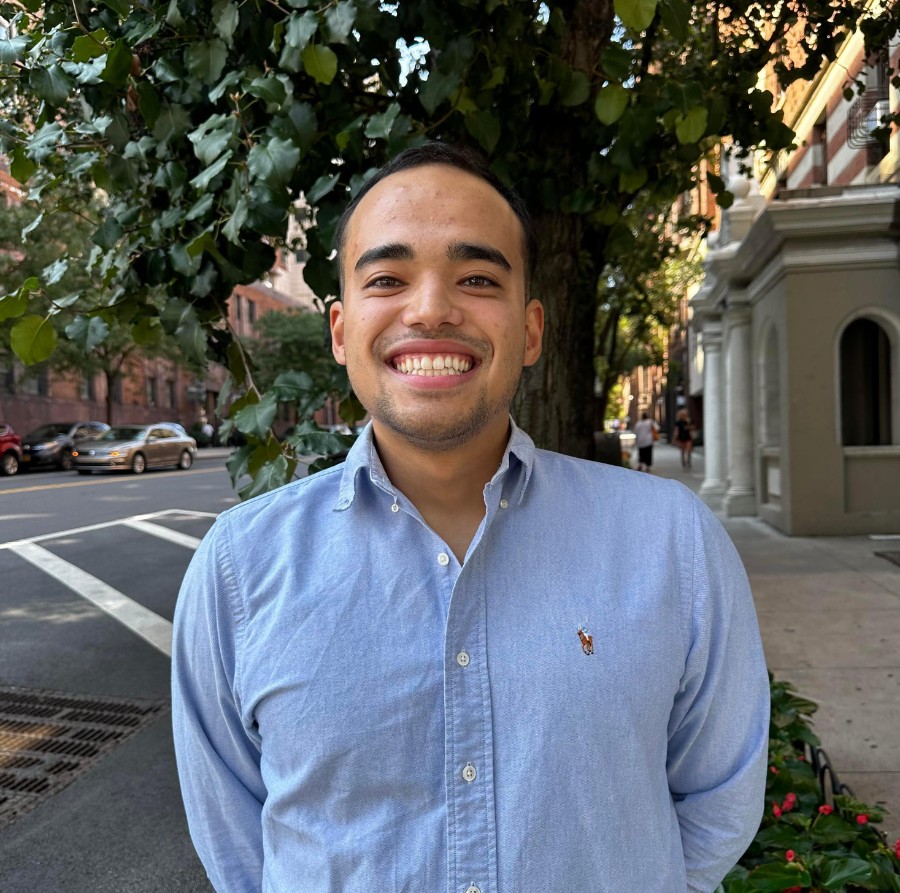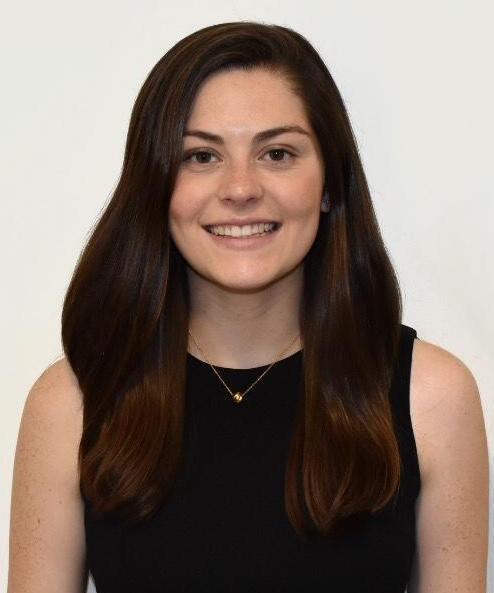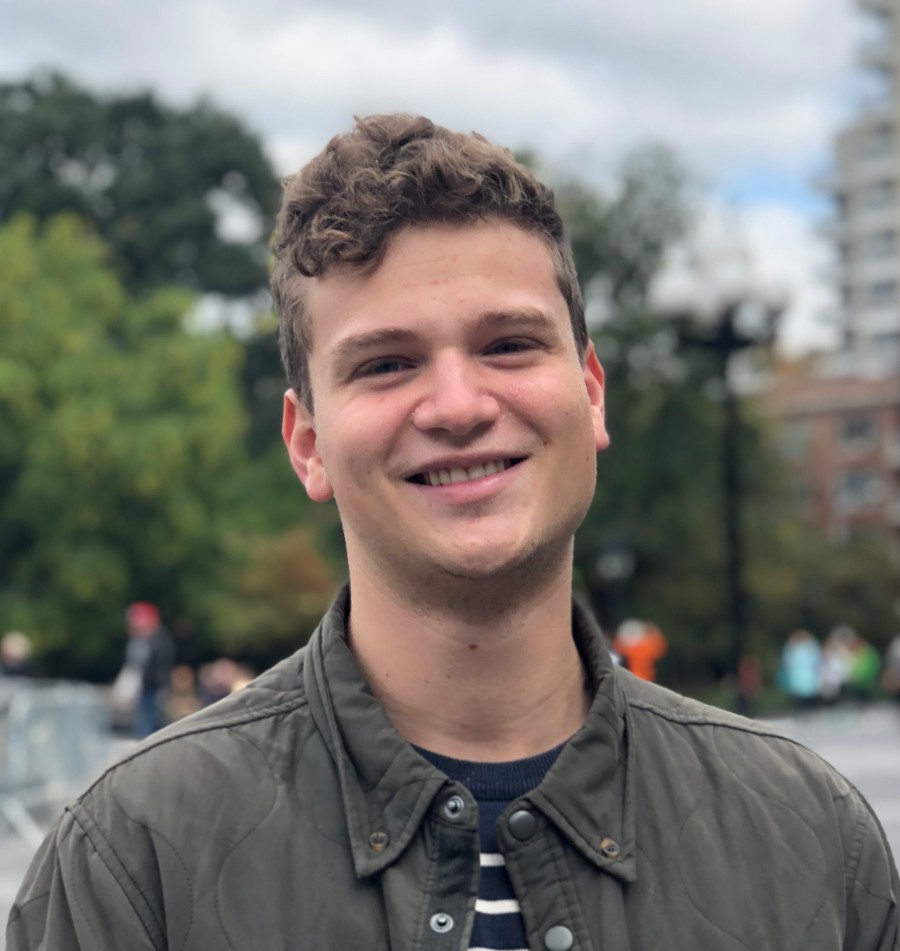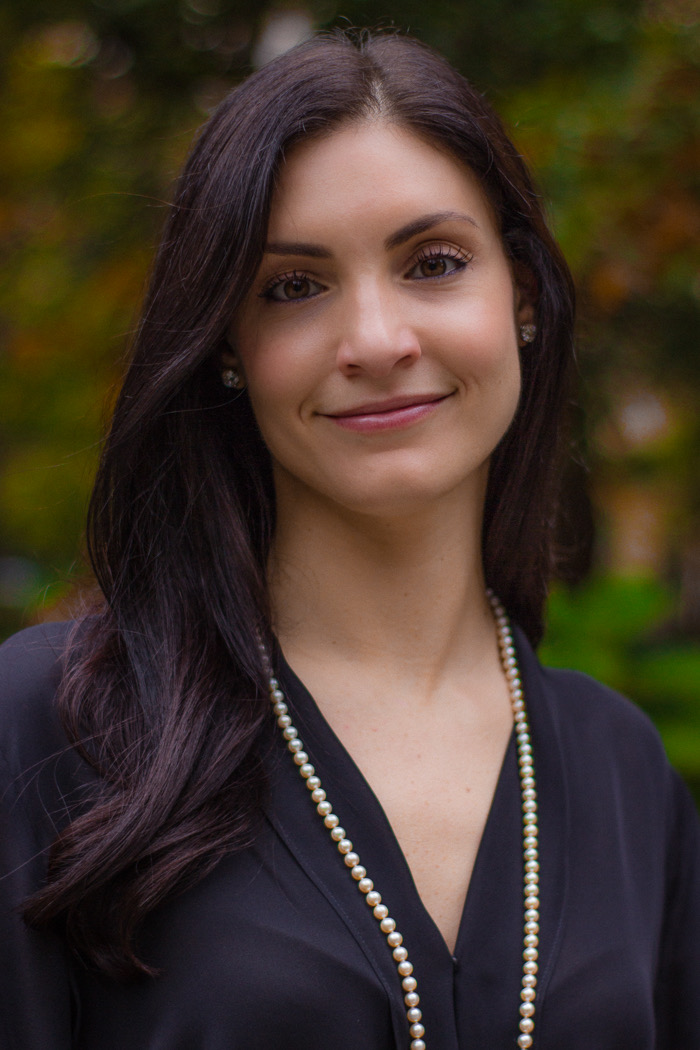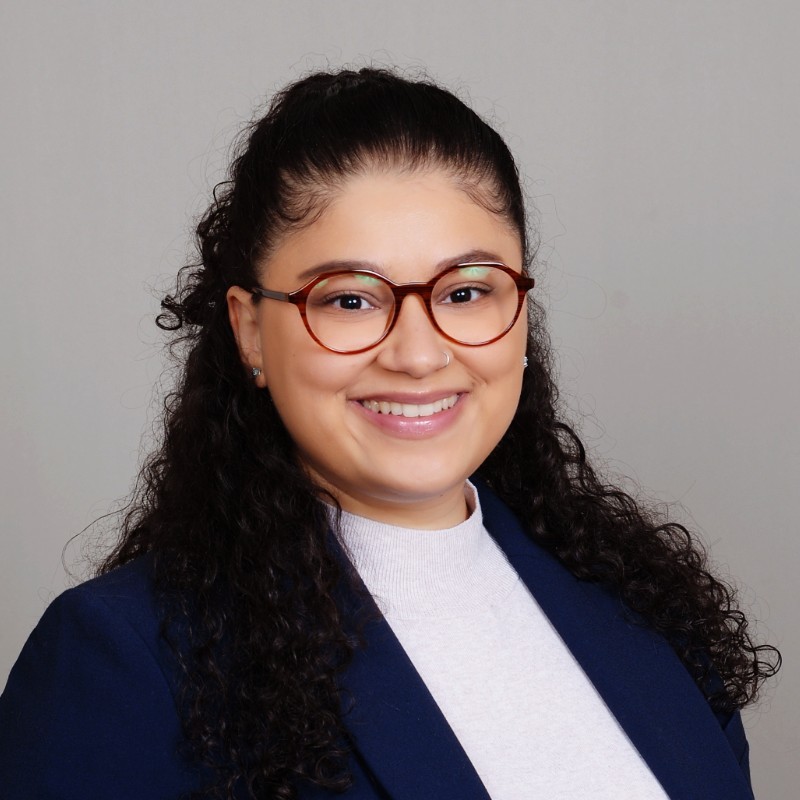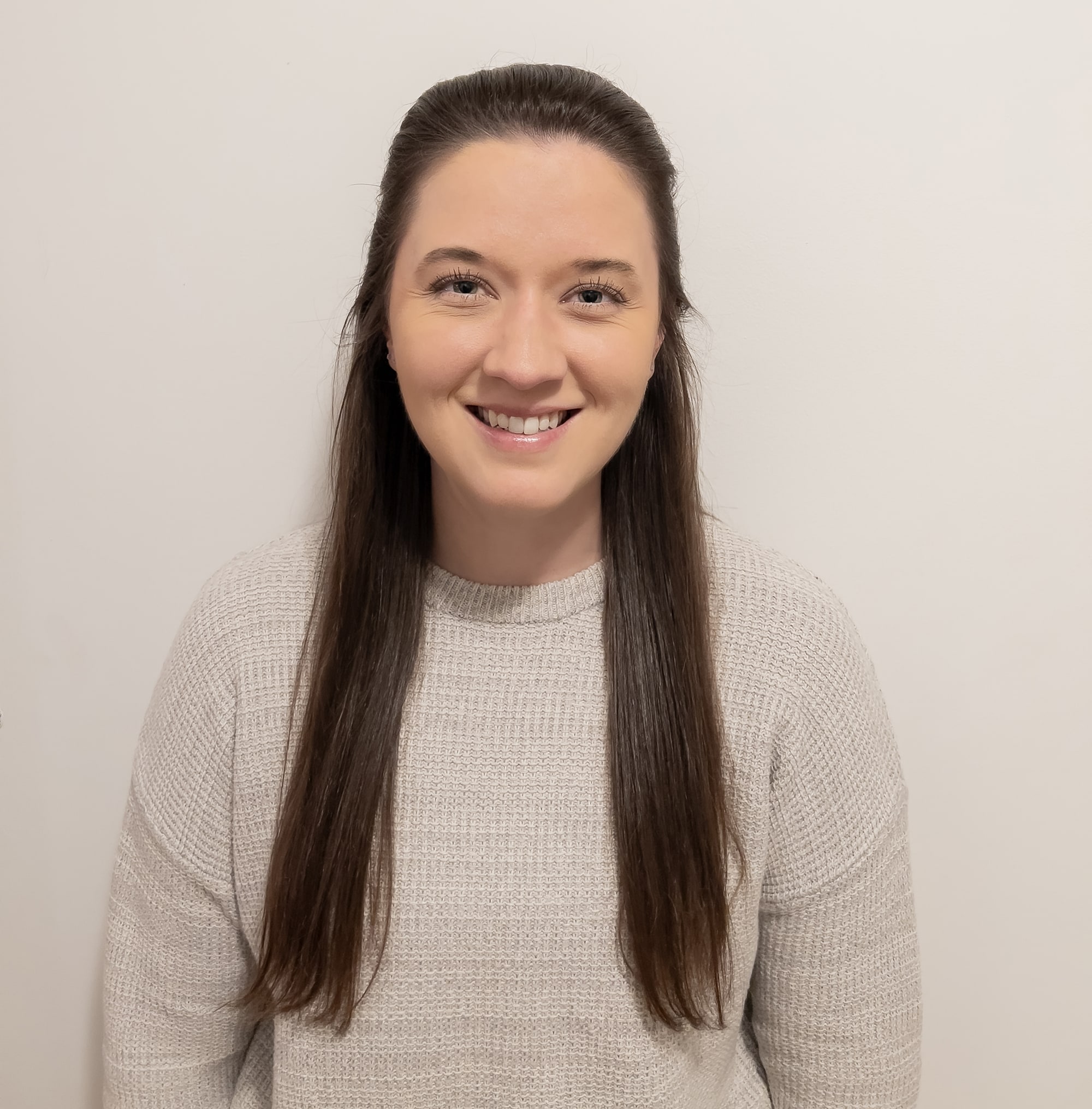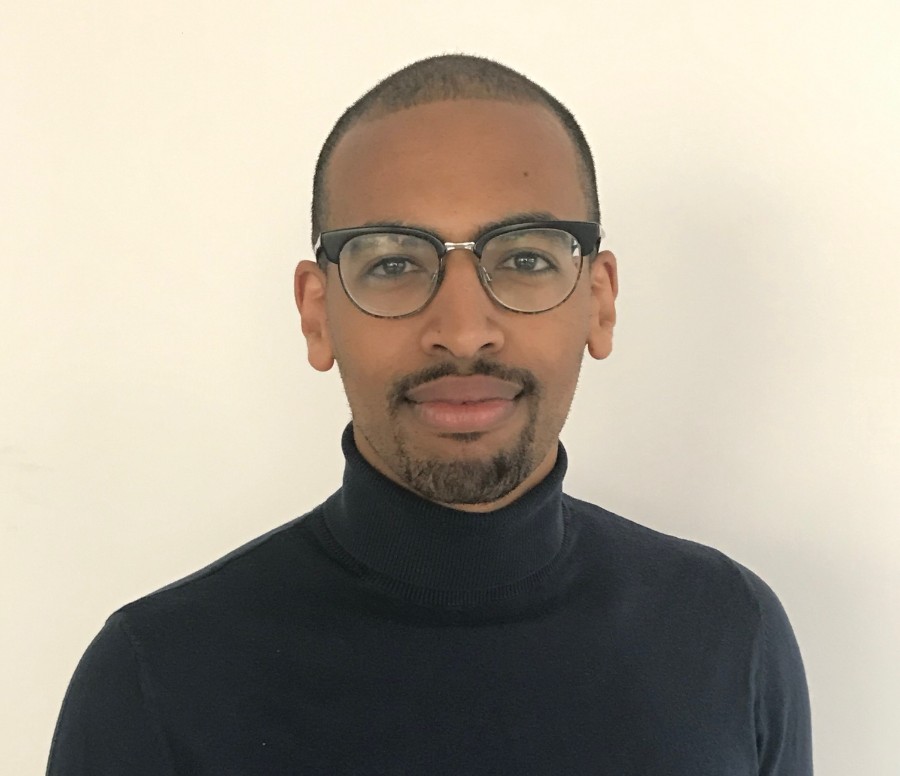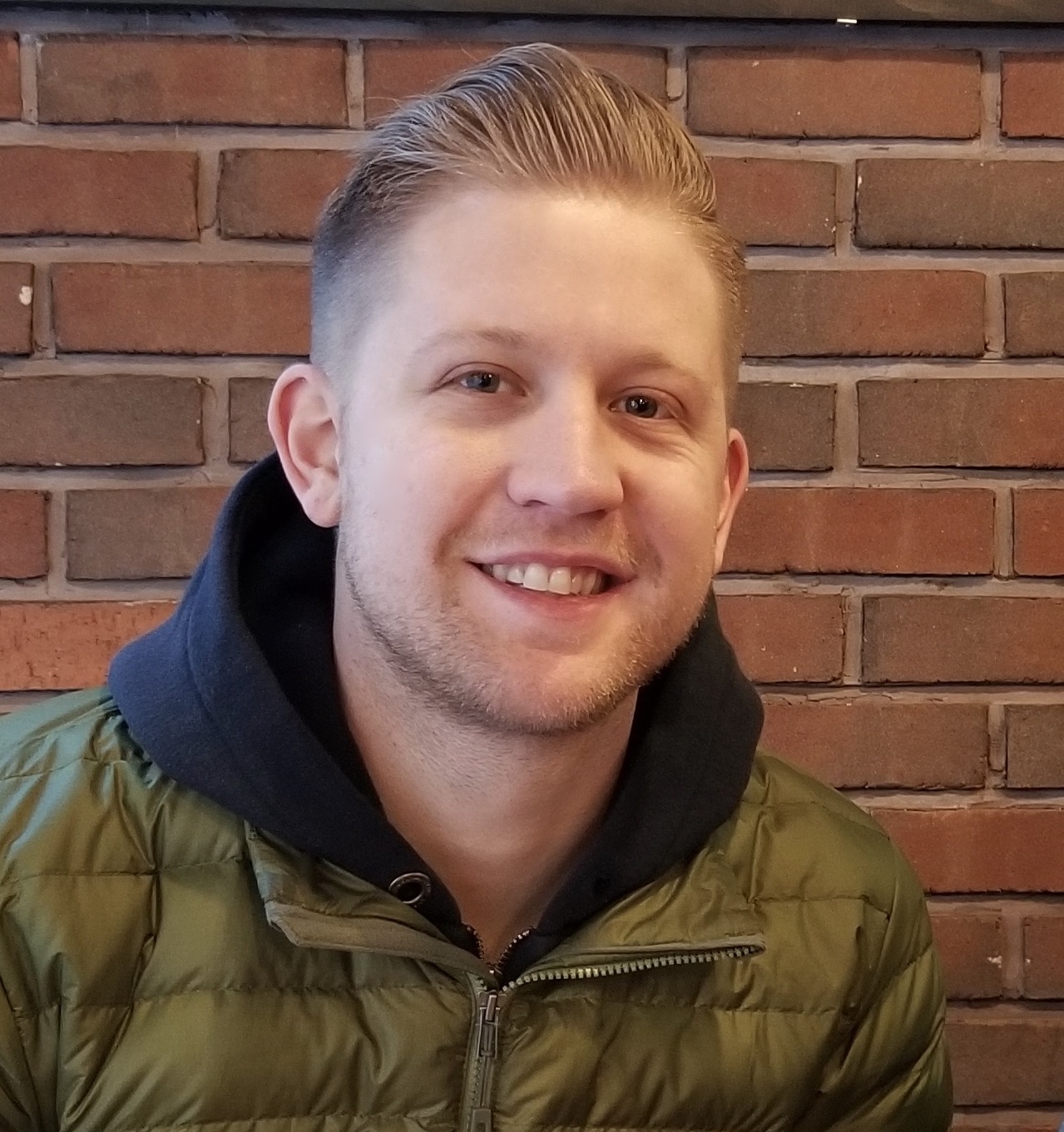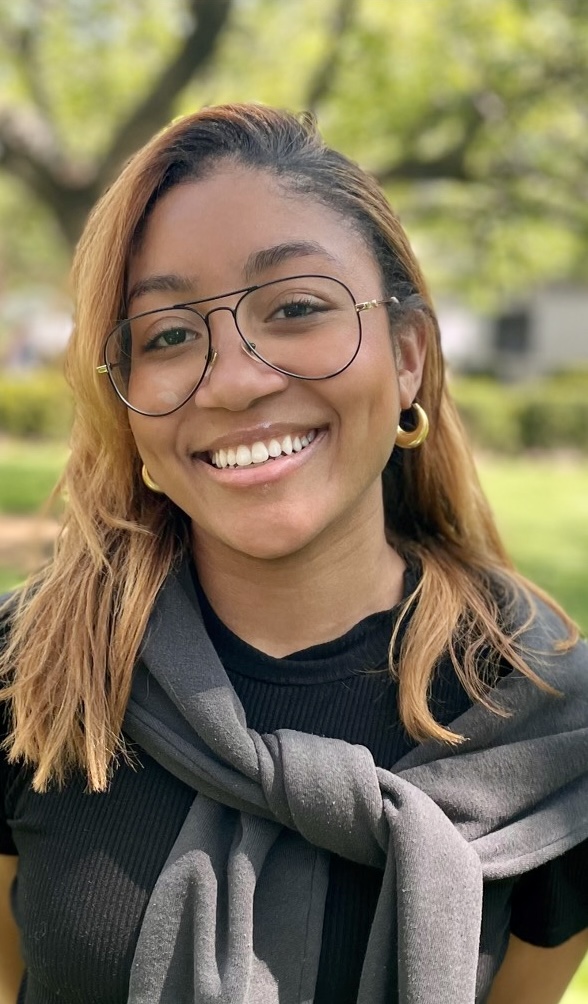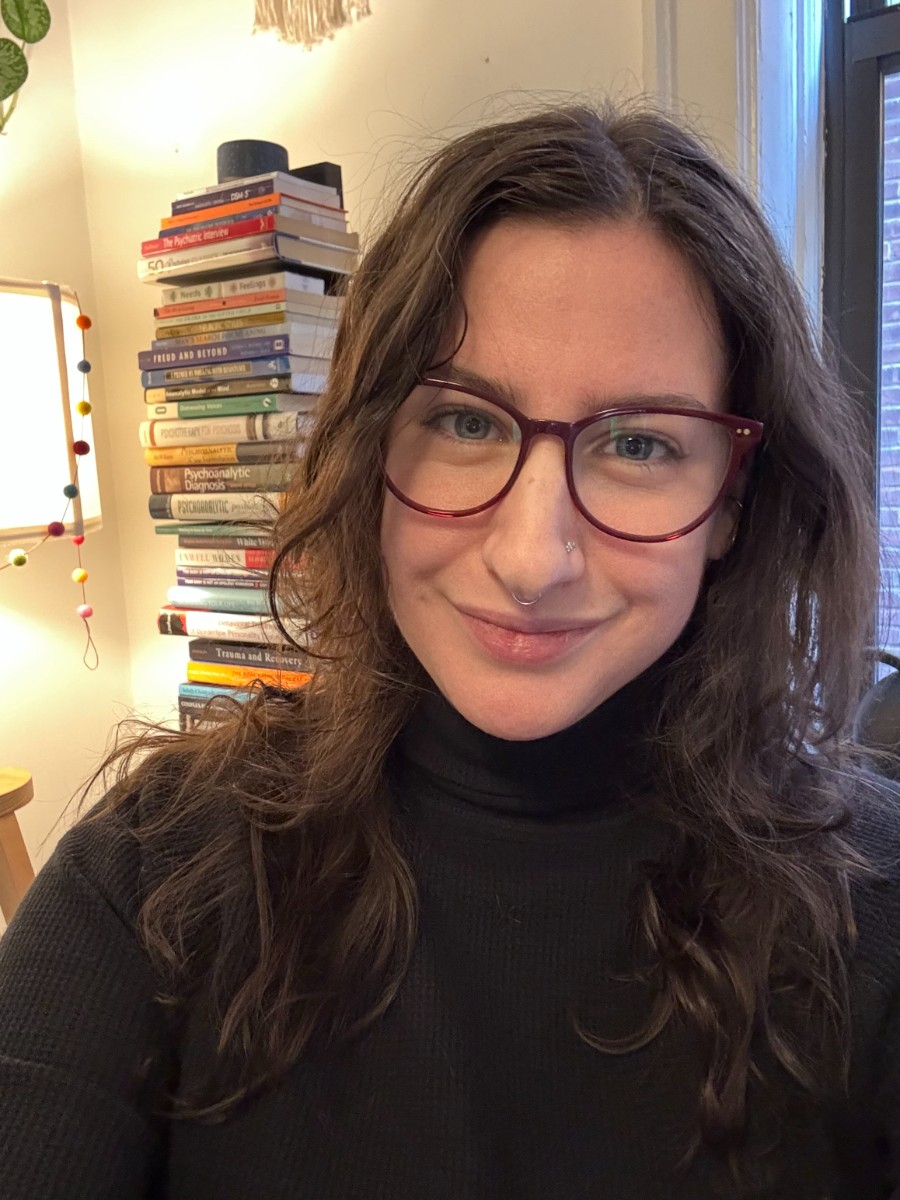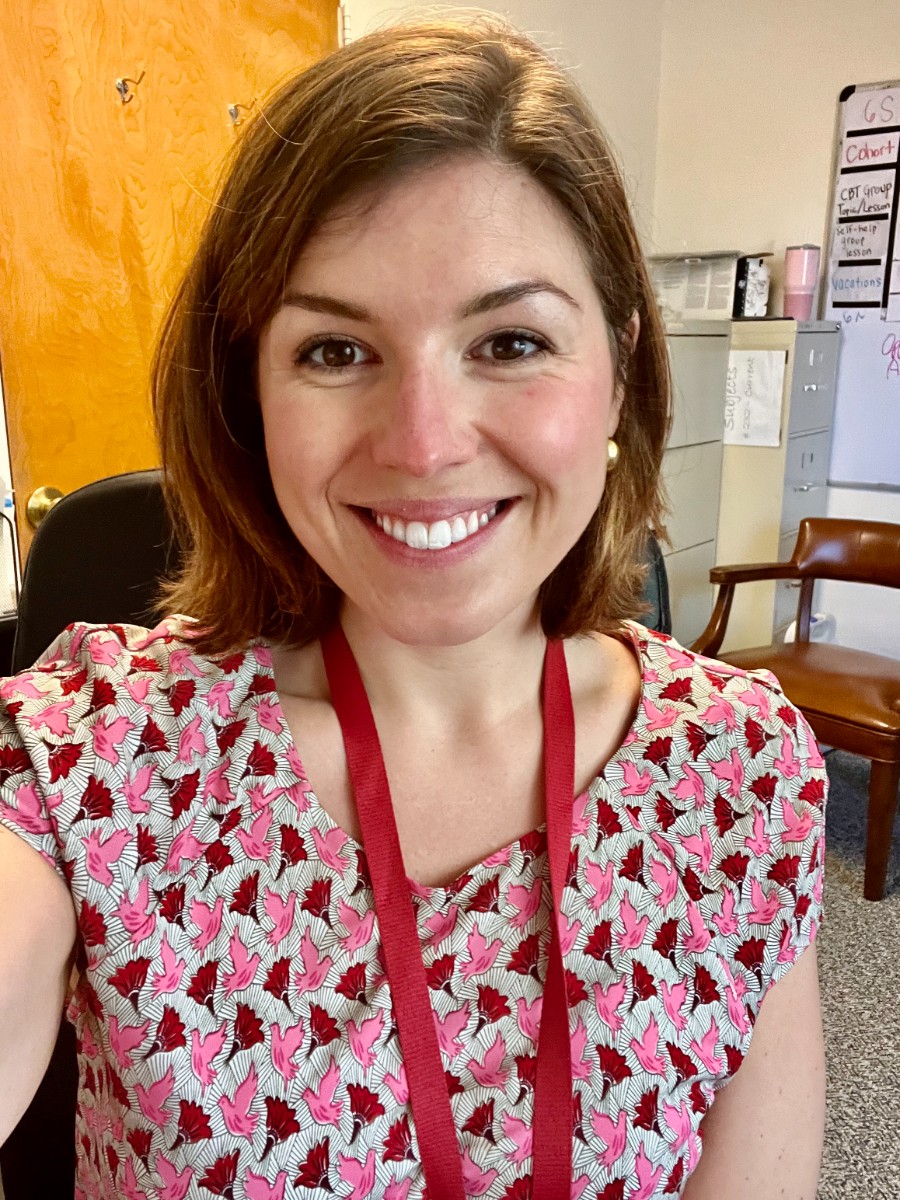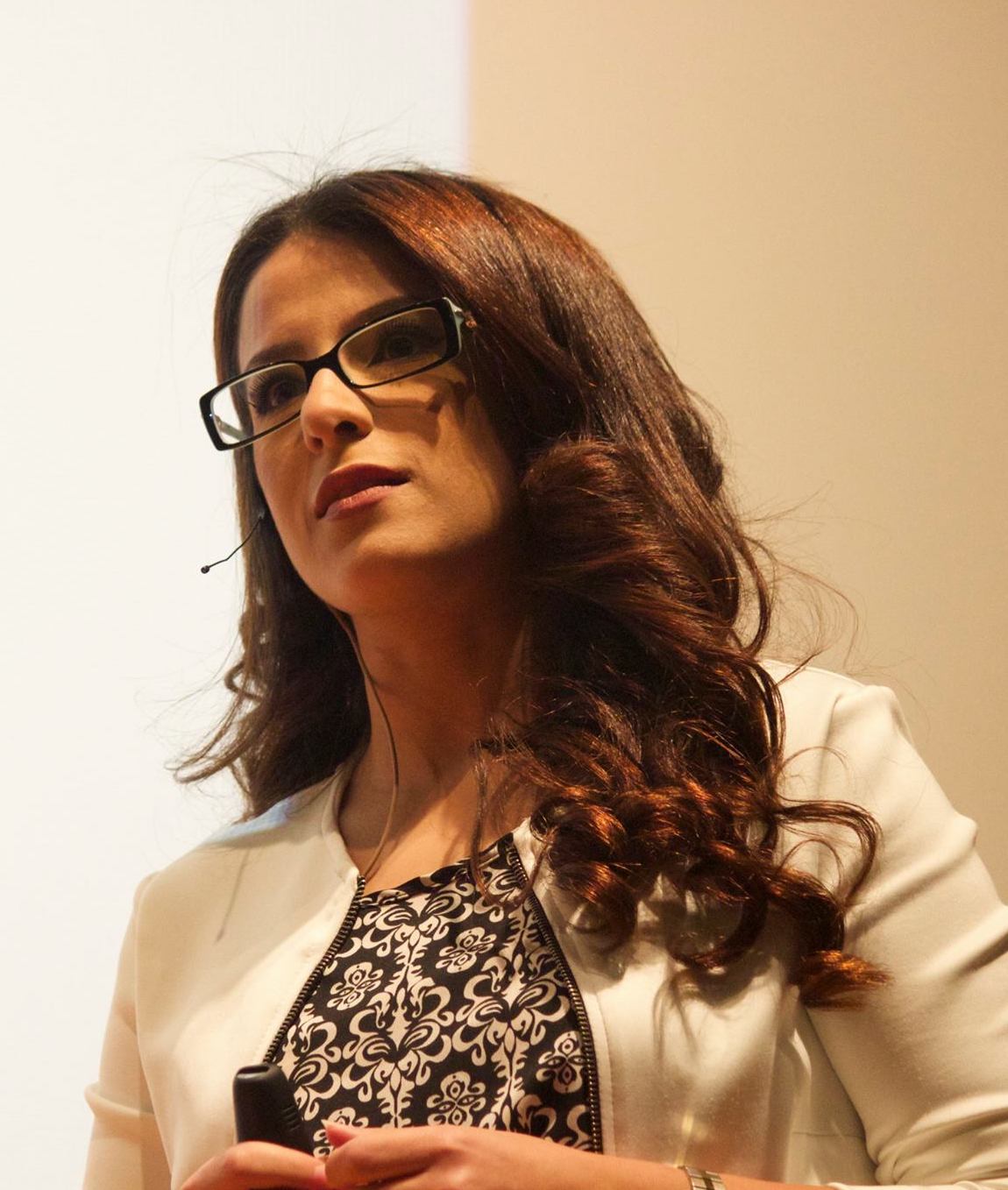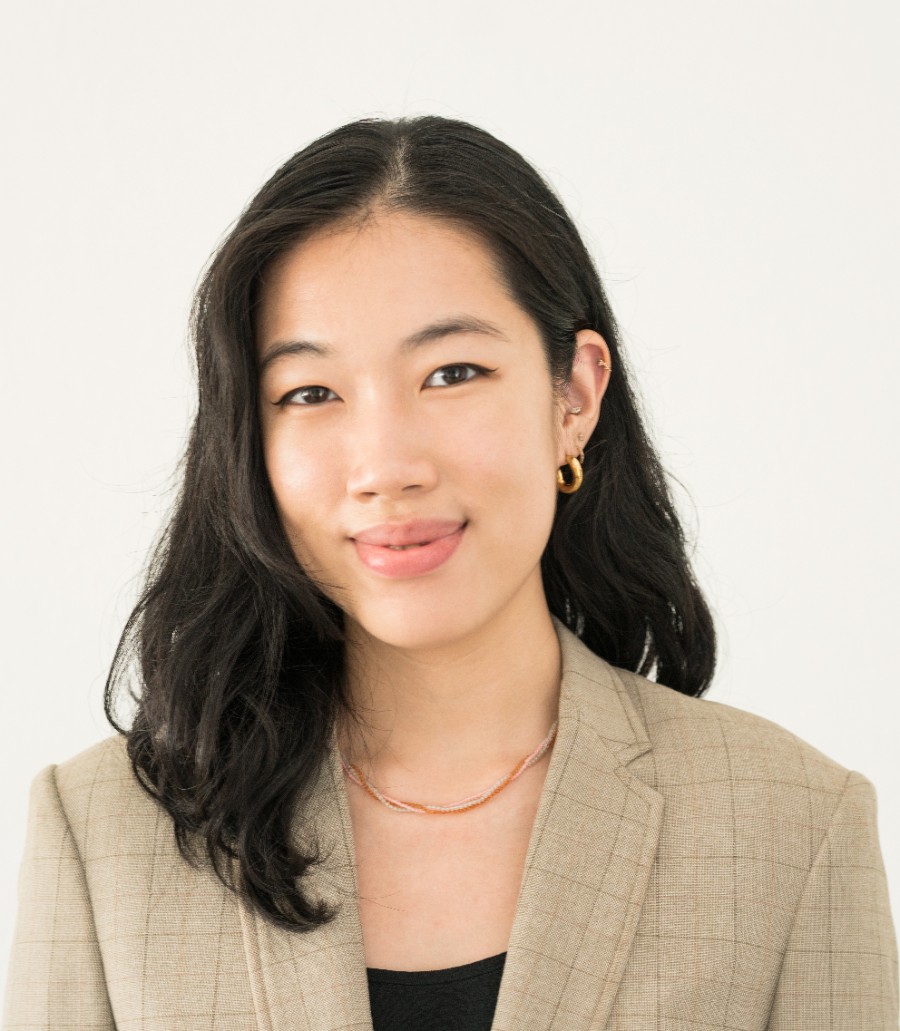Current Doctoral Students
First Year
Livia is a first-year doctoral student in the Clinical Psychology Ph.D. program at Teachers College, Columbia University, and a member of the Global Mental Health Lab. She holds an M.A. in Psychology in Education from Teachers College, Columbia University, an M.A. in Applied Economics with a Law Concentration, and a B.A. in Sociology and Political Science with a minor in English from the University at Buffalo.
She has served as a Volunteer Family Support Coordinator at the Association for Autism and Neurodiversity, providing support and resources for families with neurodivergent children. Additionally, she was a Volunteer Helpline Responder at the National Alliance on Mental Illness, helping individuals with mental health conditions and their families navigate their mental health journeys.
In the Global Mental Health Lab, Livia has worked on projects assessing the feasibility and effectiveness of Interpersonal Psychotherapy (IPT) for individuals with depression in under-resourced communities.
As a doctoral student, her research interests focus on implementing psychological interventions for families supporting neurodivergent members and individuals with disabilities, as well as improving their access to resources."
Niklas Kei Nyblom is a first-year doctoral student in the Clinical Psychology Ph.D. program at Teachers College. Born in Tokyo, Japan, Niklas was brought up in Stockholm, Sweden, in a multicultural household, including his Swedish father, Japanese mother, and two younger sisters. As a previous elite swimmer, he started his academic career as a student-athlete at Keiser University, where he graduated with a B.A. in Psychology with a concentration in human services (23’). Niklas graduated with his M.A. in Psychology in Education from Teachers College in 2025. During the M.A. program, Niklas has built a comprehensive set of research interests and skills in several labs focusing on community health through the lenses of sustainability, ecopsychology, romantic relationships, and military psychology.
Niklas has also advocated for community health through various positions and organizations. At the international service organization, the Global Healthy Living Foundation (GHLF), he worked on Japanese patient programs, started a podcast, and was GHLF’s liaison to the United Nations. Niklas also volunteers as a peer educator at Columbia Health’s Sexual Violence Response. Lastly, at Teachers College, Niklas serves as a community assistant, co-president of the student organization Sustainability Task Force, and communications editor for the Graduate Students Journal of Psychology, dedicated to making a positive impact on the student community and empowering individuals to reach their fullest potential.
It is a great honor for Niklas to be a member of the Global Mental Health Lab. He is dedicated to expanding his research interests internationally, specifically widening his cultural perspectives and skills in measurement and scaling to support research that enables local actors to drive sustainable and locally-led development programs
Second Year
Carl J. Tauberman is a second-year doctoral student in the Global Mental Health Lab at Teachers College, Columbia University, under the mentorship of Dr. Helen Verdeli. He holds a BS in Social Science from the University of Maryland (2021) which he obtained while serving United States Air Force (2010 - 2022).
With his military experience, Carl began researching transition stress for the Veteran population while attending Teachers College for his MA in Clinical Psychology (2024). This work has guided Carl in his doctoral studies as he examines access to mental healthcare for under-resourced populations, treatment trajectories, and suicidality.
Sarah is a second-year doctoral student in the Clinical Psychology Ph.D. Program at Teachers College, Columbia University. Prior to joining the Global Mental Health Lab, she worked as a research assistant at the New York State Psychiatric Institute for two years, focused on developing a provider-facing digital platform that supports task-shared mental health care in community-based settings. She also supported initiatives aimed at adapting, digitizing, and implementing Interpersonal Counseling (IPC) for various populations and contexts, including for youth in New York City and primary care clinics in South Africa.
Sarah holds a BS from the University of Toronto and a MA from Teachers College, Columbia University. At the Global Mental Health Lab, she has supported projects investigating the effectiveness and feasibility of Interpersonal Psychotherapy (IPT) for refugee populations in Peru and Tanzania and mothers in Kenya. Sarah’s research interest lies in harnessing technology, task-sharing, and community-based approaches to implement and disseminate brief and scalable interventions, with a focus on closing the treatment gap for adolescents and young adults.
Third Year
Caroline is a third-year doctoral student in the Clinical Psychology PhD program at Teachers College, Columbia University, and a member of the Global Mental Health Lab. She graduated from Georgetown University in 2020 with a BA in Psychology and a minor in Business Administration and Spanish. In 2023, she completed an MA in Clinical Psychology at Teachers College. Her prior clinical experiences include co-leading DBT skills groups for young adults, leading support groups through the National Alliance on Mental Illness, and working with patients to ensure continuation of care post-hospitalization. Her early research experiences include working with teenage parents to develop and hone their coparenting skills.
In the Global Mental Health Lab, Caroline has worked in varying capacities on projects relating to distress in post-partum women during the COVID-19 pandemic, understanding childbirth experiences and their impact on women in New York City, and evaluating the effectiveness of IPT in treating women with post-partum depression in Ontario. She has also helped work on a meta-analysis that sought to understand how nutrition and mental health impact the birthweight of children in low- and middle-income countries. In the future, Caroline hopes to continue studying maternal mental health and become more involved in suicide prevention and management research.
Corey Morrison is a third-year doctoral student in the Clinical Psychology program at Teachers College, Columbia University. He graduated from Brown University in 2019 with a BA in Public Health. Prior to joining the Global Mental Health Lab at Teachers College, Corey worked as a research assistant at the New York State Psychiatric Institute working on a longitudinal study of psychosocial outcomes in a sample of youth perinatally affected by HIV in New York. While at the Psychiatric Institute, Corey also worked to pilot an mHealth neurocognitive assessment tool for use in Uganda, South Africa, and Thailand.
In the Global Mental Health Lab, Corey's research interests center on addressing the psychological needs of diplacement-affected groups, particularly refugee and conflict-affected communities. Corey is especially interested in evidence-based approaches to promoting resilience, post-traumatic growth, and social and community cohesion in resource-limited settings.
Fourth Year
Alexandra L. Simon, MA is a fourth-year doctoral student in Clinical Psychology at Teachers College, Columbia University, where she conducts research in the Global Mental Health Lab under the mentorship of Dr. Helen Verdeli. She holds an MA in Psychology from The New School for Social Research and a BA in Philosophy, Politics, and Economics (PPE) from the University of Pennsylvania. Prior to her transition into psychology, Alexandra had a decade-long career working in Finance.
Alexandra brings a thoughtful, interdisciplinary perspective to her work. Her research is centered on scalable, evidence-based mental health interventions for underserved populations. She has built a comprehensive set of clinical skills in several evidence-based therapies including Interpersonal Psychotherapy, Cognitive Behavioral Therapy, Dialectical Behavior Therapy, Acceptance and Commitment Therapy, and Psychodynamic Psychotherapy. Alexandra has also received extensive training in neuropsychological testing.
In the Global Mental Health Lab, Alexandra works with colleagues to explore ways in which to disseminate and implement services that are appropriate for resource-constrained regions globally, with an emphasis on serving the Veteran community. Alexandra is currently the NYC Site Coordinator for a multi-site study in partnership with the VA’s VITAL Program, implementing Interpersonal Counseling-3 (IPC-3), a brief intervention delivered by trained Student Veteran Peer Mentors to reduce stigma and improve access to mental health care for fellow veterans.
Alexandra is currently leading a study that builds on a prior meta-analysis linking artificial nutrition and hydration (ANH) to maternal mental health outcomes. Her project investigates how climate-related stressors and global food insecurity impact the psychological well-being of antepartum and postpartum women, particularly in low-resource settings. Her work aims to inform intervention design through integrated data modeling and systematic review methodologies.
Chelsea is a fourth-year doctoral candidate in the Clinical Psychology Ph.D. program at Teachers College, Columbia University. She holds an MA in Psychology in Education with a concentration in Global Mental Health and Trauma from Columbia University (2022) and a BA in Psychology with a minor in Education & Child Study from Smith College (2017). Prior to beginning the MA program at TC, Chelsea spent two years working as a full-time research assistant at Brown University’s Alpert Medical School/The Miriam Hospital’s Weight Control and Diabetes Research Center (WCDRC) in Providence, Rhode Island. At the WCDRC, she offered assistance on four longitudinal studies focused on lifestyle interventions. During her time in the MA program, she worked as a volunteer research assistant on various projects at the GMH Lab. Those projects centered on assessing the feasibility and effectiveness of Interpersonal Psychotherapy (IPT) and Interpersonal Counseling (IPC-3) in under-resourced settings with refugees around the globe. As a doctoral student and Health Resources and Services Administration (HRSA) scholarship recipient, Chelsea will receive training to offer psychological services (under the supervision of a licensed psychologist) within a clinic setting to Spanish-speaking clients living in New York City. Chelsea is interested in the dissemination and implementation of evidence-based treatments for depressed adolescents, the intersection of global mental-health research and policy, and improving mental health services and accessibility for those living in low-income and under-resourced communities.
Fifth Year
Erin is a fourth-year doctoral student in the Clinical Psychology program at Teachers College, Columbia University. In 2018 Erin graduated with a BA in Psychology and a minor in anthropology from the University of North Carolina, Wilmington. In 2020, she received her MA in Clinical Psychology from Teachers College. During the MA program, Erin worked on treatment research at Teachers College and implementation research in the form of program evaluations at Mount Sinai. At Mount Sinai, Erin had the privilege of working on program evaluations for innovative trauma-informed programs for transgender survivors of violence and programs for men in Harlem who were the survivors of crime or trauma.
In the Global Mental Health Lab, Erin works on the evaluation and implementation of mental health services in historically underserved and marginalized populations. Specifically, she is interested in using community-based participatory action research to evaluate the effectiveness, acceptability, and feasibility of culturally informed therapeutic interventions delivered by community members in Harlem. Erin also works with transitioning service members, student Veterans, and Veterans broadly both in the lab and at the Bronx VA.
Hania Mourtada is a fourth-year doctoral student in the Clinical Psychology PhD program at Teachers College, Columbia University. She is currently a psychology extern at Jacobi Hospital where she is completing rotations in Psycho-Oncology, the Comprehensive Addiction Treatment Center, and Inpatient Psychiatry.
Hania’s research interests center around understanding and addressing the mental health consequences of war, displacement, and political violence. She is particularly interested in the experiences of survivors of torture, identity reconstruction, and changes in self-concept following complex trauma. As a researcher, Hania is deeply committed to a community-based participatory approach that centers the voices of traditionally marginalized populations.
In the Global Mental Health lab, Hania has played a key role in multiple capacity-building projects, including the evaluation of Interpersonal Psychotherapy (IPT) scalability using a training-of-trainers model in Lebanon, IPT for perinatal depression in primary care settings in New York City, Group IPT (IPT-G) for perinatal depression in Lebanon and Kenya, and Interpersonal Counseling (IPC-3) for college students in Iraq.
Before pivoting to clinical psychology, Hania worked as a news reporter in the Middle East, covering the Syrian conflict and refugee crisis. Her previous career in journalism and advocacy profoundly influenced her interest in the psychological impacts of oppression, deprivation, and marginalization.
Hania earned her M.A. in Clinical Psychology in 2020, with a concentration in Global Mental Health, from Columbia University. She also holds a joint M.A. in Journalism and Middle Eastern Studies from New York University and an M.Sc. in Developmental Psychology from University College London.
Sixth Year
Tarik Endale, MSc is a doctoral candidate in the Clinical Psychology program and an affiliate of the Center for African Education at Teachers College, Columbia University. He is a predoctoral intern at NYC H+H Jacobi Medical Center. Previously, Tarik was a psychology extern at Montefiore Medical Center Substance Abuse Treatment Program (SATP) and the Dean Hope Center for Educational and Psychological Services (DHCEPS). He also worked as a HRSA funded Integrated Behavioral Health trainee providing evidence-based treatment in primary care at Ryan Health.
Tarik’s research focuses on two major threads globally and domestically: 1) adaptation, implementation, and evaluation of mental health interventions for populations facing adversity; and 2) sociocultural and structural determinants of mental health and service use. His dissertation research examines the role of structural racism, social determinants of health, and discrimination in the mental health and service use of Black adults in the U.S. during the COVID-19 pandemic. In the GMH Lab, Tarik has supported studies including a UNHCR funded project implementing Interpersonal Psychotherapy (IPT) among refugees in Bangladesh, Tanzania, and Peru; a NIHR funded RCT implementing and evaluating IPT for maternal depression in Lebanon and Kenya; and an USAID funded C-RCT examining group IPT and livelihood interventions in Ethiopia.
Before joining the GMH Lab, Tarik conducted evaluations and research on Grand Challenges Canada funded global mental health projects with Results for Development and the Mental Health Innovation Network, worked as the mental health coordinator for King’s Sierra Leone Partnership, and was the Program Manager for the newly founded Kovler Center Child Trauma Program, which provides trauma-focused mental health and social services for immigrant and refugee youth and their families in Chicago. Tarik graduated from the London School of Hygiene and Tropical Medicine and King’s College London with an MSc in Global Mental Health. He obtained a BS in International Health and Psychology from Georgetown University.
DJ is a fifth-year doctoral student in the Clinical Psychology program at Teachers College, Columbia University. He holds an MA in Clinical Psychology from Teachers College (2020) and a BS in Psychology from Grand Canyon University (2018). In the Global Mental Health Lab, he works on the implementation and dissemination of mental health services to under-served and under-resourced populations, with an emphasis on serving the Veteran community. DJ is particularly interested in system-wide interventions to reduce Veteran suicide, exploring how culturally informed community engagement can enhance the success of the military-to-civilian life transition, and how social factors influence the trajectory of treatment-seeking behavior. Before enrolling at Teachers College, DJ served as an Air Traffic Controller in the US Air Force for six years and was involved in over 200,000 flying operations. As a MA student, he was the assistant evaluator on a program evaluation of the Veterans Treatment Track in New York's 9th Judicial District. He also had a leading role in the implementation and dissemination of the ETS Sponsorship program for transitioning servicemembers, which is now a nationwide VA and DoD program.
Jada Rene Flint is a fifth-year doctoral student in the Clinical Psychology PhD program at Teachers College, Columbia University, where she is also a member of the Global Mental Health Lab. She earned her Bachelor of Arts degree in Africana Studies and Psychology from Smith College in 2018. In 2020, she completed her MA in Clinical Psychology and received a certification in Sexuality, Women, and Gender from Teachers College.
In the Global Mental Lab, Jada focus her research on the intricate aspects of suicidality within the African American community. Her dedicates lies in the exploration and identification of distinct traits linked to suicidal ideation and behavior among Black youth, with the ultimate goal in enhancing targeted and effective prevention strategies and interventions. Currently, she is collaboring with NYU McSilver Institution for Poverty Policy and Research on their WeCare Study, which seeks to implement and investigate a system of care for Black youth that combines suicide risk screening with an intervention to faciliates the connection of at-risk youth to high-quality mental health services.
Recent Graduates
Kati N. Lake (she/her) is a clinical psychologist who specializes in the treatment of trauma, mood, and anxiety disorders using trauma–informed, patient–centered approaches to care. She earned her Ph.D. from Columbia University and provides evidence-based psychotherapies, working collaboratively with patients to meet their treatment goals. Lake was trained at Columbia University Medical Center, New York Presbyterian/Weill Cornell Medical Center, and the Department of Veterans Affairs, serving in outpatient, inpatient, and residential settings. She holds expertise in Cognitive Processing Therapy, Prolonged Exposure, Dialectical Behavioral Therapy, Dialectical Behavioral Therapy–Prolonged Exposure, Cognitive Behavioral Therapy, Written Exposure Therapy, and Interpersonal Psychotherapy.
Previously, Lake served as the Vice President of Consulting Services at the Rape, Abuse & Incest National Network, a Lead Associate at Booz Allen Hamilton, and a Schedule C Political Appointee at the White House. She has over a decade of experience in program management and policy analysis. Integrating her clinical and consulting background, Lake continues to advise organizations interested in affecting culture change surrounding sexual violence prevention and response. She develops and evaluates brief, evidence–based treatments that assist in bridging the treatment gap between those that need and receive mental health care.
Jillian M. Arenz, Ph.D., (she/they) is a clinical psychologist who specializes in PTSD, trauma, and anxiety disorders, particularly relating to chronic and/or systemic stressors. She also treats mental health concerns associated with acute and chronic physical illness and provides executive functioning tutoring to teenagers and young adults. She has advanced training in several evidence-based therapies for trauma and anxiety: Cognitive Behavioral Therapy, Cognitive Processing Therapy, Dialectical Behavior Therapy, Prolonged Exposure, Acceptance and Commitment Therapy, Interpersonal Psychotherapy, Narrative and Written Exposure Therapies, Habit Reversal Training, and Exposure and Response Prevention.
Dr. Arenz works integratively and collaboratively with clients from all backgrounds, including members of minoritized groups, sexual and domestic violence survivors, veterans, survivors of war and torture, LGBTQIA individuals, and the ENM/Poly community using a trauma-informed, anti-racist, decolonized approach. She consults on implementation science research and assists with projects focusing on developing and adapting mental health interventions to increase accessibility, appropriateness, and effectiveness for underserved and under-resourced populations.
Dr. Arenz earned her doctoral degree in Clinical Psychology from Teachers College, Columbia University (2023), her M.A. in Clinical Psychology from Teachers College (2016), and her B.A. in Psychology from Kenyon College (2011). She has trained at Columbia University Medical Center, NewYork Presbyterian Hospital, the New York State Psychiatric Institute, private practices, community clinics, and completed her predoctoral internship at Bellevue Hospital/NYU Langone Medicine. She is completing a postdoctoral fellowship at the Program for Anxiety and Traumatic Stress Studies (PATSS) at Weill Cornell Medicine.
Anika F. Alix, M.A., M.S. is a doctoral candidate in clinical psychology at Columbia University. She is currently a psychology intern at Lenox Hill Hospital where she works as an outpatient therapist at the Manhattan Eye Ear Nose and Throat Hospital (MEETH) and on the medical and psychiatric inpatient floors. Previously, Anika worked providing as a psychology extern at the Presbyterian Hospital, Westchester Behavioral Health Women's/Adolescent Inpatient Unit, the New York State Psychiatric Institute’s Depression Evaluation Service, and at the Dean Hope Center for Educational and Psychological services.
Anika’s research focuses primarily on the treatment of perinatal mood and anxiety disorders (PMADS) and childbirth experience, with a specialty in qualitative methodologies. Her dissertation research uses mixed-methods approaches to examine the phenomenon and mental health sequelae of mistreatment in maternity care in New York City hospitals. She has worked as a researcher on projects examining: IPT-G for maternal depression in Uganda, postpartum depression in Kuwait, IPT treatment for perinatal depression in primary care settings in New York City, and IPT for parental depression in rural Ethiopia. Anika’s expertise and clinical interests include: cultural-conceptualizations of PMADS; childbirth education, sexual health education, and reproductive justice across the lifespan; qualitative research approaches w/ critical feminist lens; Relational Psychodynamic therapy, Interpersonal Psychotherapy (IPT) and CBT for Psychosis (CBTp).
Anika graduated from Teachers College, Columbia University with an MA and MS in Clinical Psychology, and a certificate in Sexuality Women and Gender. She earned her BA at University of Miami (FL) where she majored in French and Psychology.
Alaa is a seventh-year doctoral student and is the principal investigator of a qualitative study investigating the adjustment and acculturation of Arab women in the U.S., and in a qualitative study investigating postpartum depression and its care pathways with women and key stakeholders in Kuwait; She has been a research assistant (TC Global Mental Health Lab) during which she assisted in various projects to obtain psychological services and health services for Syrian refugees in Jordan. Previously, at the NYU Bellevue Stress and Resiliency Study she assisted in study of factors predicting PTSD in individuals admitted to the emergency room with life threatening injuries; Massachusetts General Hospital, Division of Global Psychiatry: assessed the impact of trauma on Liberian children’s self-esteem, self-concept, and resilience. She is also the co-founder for Standing for Psychological Education and Awareness in Kuwait.
Dalal Alhomaizi is an eighth-year doctoral student at the Global Mental Health Lab at Teachers College (TC), Columbia University. She completed her undergraduate education at Northeastern University in Boston, MA where she attained a Bachelor’s of Science in Psychology. Dalal has worked as a research assistant at the Chester M. Pierce, MD Division of Global Psychiatry at Massachusetts General Hospital where she worked on global research, policy, and development projects in low-income and resource-poor countries. She has also co-founded the first mental health anti-stigma campaign SPEAK alongside her twin sister in her home country Kuwait. Prior to starting her PhD, Dalal completed a Masters of Arts in Clinical Psychology at TC. Dalal’s research interests include help-seeking behavior, program development and evaluation, psychotherapy research, and psychometric research with a specific interest in resource-poor countries. Dalal's dissertation will explore the development and validation of cross cultural psychometric measures for Kuwait.
Anne is a sixth-year doctoral student in the Clinical Psychology program. She received her B.A. in Human Development and Social Relations at Kalamazoo College and her M.A. in Psychology in Education at Teachers College. As a master's student at Teachers College, Anne began work in the Global Mental Health lab assisting with qualitative research studies assessing the mental health needs of home-based sex workers in India and of unaccompanied immigrant children in the US. Previously, she worked with adults with severe mental illnesses at a community mental health organization and volunteered in the Clinical Alternatives to Punitive Segregation unit at Rikers Island leading a weekly yoga group. Anne is interested in adapting effective mental health interventions for low-resource populations to meet their unique contextual needs. She is currently working on a project to build capacity of interpersonal psychotherapy and integrate mental health treatment into primary care settings in Lebanon and another project aimed at IPT dissemination for treatment of maternal depression in New York City.
Srishti Sardana, MSc., MA, is a doctoral candidate in the Clinical Psychology program and Lab Coordinator of the Global Mental Health Lab at Teachers College, Columbia University. She has assisted on various projects with aims to study efficacy and effectiveness of IPT and other related intervention variables in low- and middle-income countries. She assists on studies including the Grand Challenges Canada funded IPT scalability for Syrian refugees in Lebanon, UNHCR funded IPT implementation for treatment of depression among Rohingya refugees in
Cox’z Bazar, Bangladesh & Congolose and Burundian Refugees in Tanzania, another project focused on developing a practical toolkit for climate justice and mental health for community-based organizations, and has implemented a pilot study to assess the mental health needs of home-based female sex workers in rural India. Before enrolling at Teachers College, Srishti served as an officer in the juvenile offender unit at the Institute of Juvenile Justice, Delhi Police, India and initiated a narrative therapy-based intervention project in collaboration with a team of Australian psychotherapists for youth offenders committed for felonies and sex offence. Srishti is currently working on developing her research program that studies social capital and social support networks, and is adopting innovative methods of studying these constructs from a dual economic-mental health lens to examine the potential mediating role of conflict and support in recovery from depression among Stateless Rohingya refugees in Bangladesh.
Cheryl Y. S. Foo, Ph.D. is currently a postdoctoral Clinical and Research Fellow at Harvard Medical School (HMS), Massachusetts General Hospital Center for Psychosocial and Systemic Research. She received her Ph.D. in Clinical Psychology from Columbia University, and completed her predoctoral clinical fellowship at the HMS-affiliated Massachusetts Mental Health Center, Early Psychosis Track. She was a Research Assistant and Grant Coordinator at the Global Mental Health Lab from 2015 to 2022.
Cheryl is a clinician-scientist committed to advancing dissemination, implementation, and capacity-building of culturally and contextually appropriate, evidenced-based mental health and psychosocial interventions in under-resourced settings. At the GMHLab, she managed the Global Challenges Research Fund, Research for Health in Conflict (R4HC-MENA, United Kingdom) grant to adopt and scale-up Interpersonal Psychotherapy (IPT) in Lebanon, in partnership with Lebanon’s Ministry of Public Health, National Mental Health program. She also assisted on the UNHCR-funded adoption study to build capacity and deliver IPT for Rohingya refugees in Cox’s Bazar, Bangladesh. To inform sustainable implementation efforts by addressing provider-level psychosocial wellbeing, her dissertation was a mixed-methods study building a psychosocial model for burnout and resilience among humanitarian aid workers, to inform sustainable global mental health implementation. Complementing her skills in global mental health and implementation science research with her clinical expertise in treating chronic and serious mental illness, her current research program focuses on articulating and implementing systemic approaches for early risk identification and intervention of mental illnesses for clinical high-risk youth in community-based and integrated care settings.

